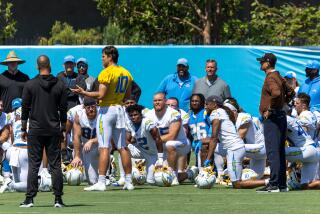Return to game is on his mind
- Share via
SCOTTSDALE, ARIZ. — Five months after his unceremonious exit from Colorado, Gary Barnett was standing in a hotel lobby when he was approached by a hyper young man claiming to be a college student in town on a job interview.
The student frantically explained he was stranded in town for an extra night, didn’t have any money and could really use some help finding a cheap hotel room ... or money to pay for one.
Without pause, Barnett pulled two $100 bills out of his pocket and handed them to the man, along with a business card so he could make good on his promise to send money back to the coach.
Months went by. Barnett never saw the payback. He had tried to do the right thing, but he came out on the wrong end of the deal.
*
At first glance, it’s very clear things could be worse for the former Buffaloes coach.
He lives in a gorgeous house in the foothills of Scottsdale. His wife of 38 years, Mary, adores him. He plays lots of golf. He has a good job as a radio and TV analyst to keep his mind in the game should another school come calling someday.
Second chances in the coaching profession, after all, are as common as the rattlesnakes that slither about the desert scrub outside his house.
But now that he has sat out a year, including a hiring season in which he made it known he was available but never received so much as a phone call, Barnett wonders if “someday” will ever come.
“I don’t know what to do,” the coach said during a long, open and vulnerable interview that might have surprised those who know him only for his troubles at Colorado. “I’d like to be here strategizing, but there’s nothing you can do. There are no cards in our hands. I’m not in control of any of this.”
The reasons for Barnett’s downfall are well known.
He oversaw a program that became a symbol of everything wrong with big-time college sports. Allegations of rape, debauchery and malfeasance rained down during a two-year flurry of investigations, lawsuits, firings and resignations.
In the end, though, Barnett was done in simply for being a winning coach who lost his mojo. He was on his way toward a contract extension -- he says he already had been cleared to tell his assistants the agreement was in place -- until the Buffs lost their last three games by a combined score of 130-22.
In the court of public opinion, not much attention was paid to his wins and losses. There, he was convicted of being an aloof autocrat who fostered a climate that was hostile toward women, used unscrupulous methods to lure recruits, handled the program’s finances ineptly and was tone deaf when he tried to set things straight.
Despite all that -- or maybe because of it -- he wants back in the business, even though the $3-million buyout he received has the 60-year-old coach set for life.
“Once you’re a coach and you teach, that’s how you get fulfilled,” Barnett said. “You don’t just pull yourself away from that. You don’t just get pulled away from that without feeling some kind of tear. Especially the way it happened for us.”
*
Barnett concedes he made mistakes. Yet as he and Mary ponder a strategy to reclaim his career and restore his reputation, they do it without a roadmap.
Sure, America loves a sincere apology. But if Barnett gave one, who would it go to -- and for what?
The women who alleged rape by CU players and recruits during Barnett’s tenure never had a case that resulted in criminal charges.
The only NCAA rules violated during Barnett’s seven years were self-reported and secondary in nature.
The finances of Barnett’s much-scrutinized football camp were a mess, but no laws were broken, and the IRS never asked a single question.
Even so, Barnett’s tenure was filled with ugly legal proceedings of seemingly every type, which led to leaked depositions that often portrayed CU football as a renegade program led by a coach who didn’t seem to get it.
Barnett disputes that depiction, but he’s well aware the natural reaction of his detractors will be to say he’s in denial. Asked how he would counteract that charge, he and his wife concede they have no clue.
“You’re not perfect. You don’t always handle everything the way you might have wished you had,” Mary Barnett said. “But he didn’t break any rules. And he didn’t do anything with bad intent. What else can you say? What else can you do?”
In their eyes, they are valid questions.
Because Barnett insists that although he has learned things in the tumult of the last several years, he is not a changed man.
That’s because, he says, he never has been the man he’s been made out to be.
“The way some people portrayed me, I’m just the opposite of that,” said Barnett, who has one son, one daughter and his first grandchild on the way. “And I can’t get that back. You talk to the people who know me, the people who have worked for me and, to a person, they’ll tell you I’m just the opposite of how I’ve been portrayed.”
*
The testimonials come from different places -- some expected, some not.
One came in the form of an e-mail Barnett received from Ron Hudson, a coaching foe when Hudson was offensive coordinator at Kansas State.
The two recently ran into each other on an elevator in San Diego.
“I do know one thing, you belong on the sideline,” Hudson wrote. “Football needs people like yourself. You were a tribute to the game. I hope someday you will be back doing what you do so well and that is ‘lead.”’
Another came from Barnett’s former administrative assistant, Kathy Brent, a neighbor of Barnett’s who dealt with him as much any other woman, save his wife, over the last five years.
She, too, is looking for new work. But as she seeks employment elsewhere, her job interviews often devolve into gawking “what really happened” sessions with the potential new employers. If that’s what she encounters, one only can imagine what Barnett’s next job interview -- if an athletic director is willing to take that chance -- might be like.
“Your first instinct is to say, ‘Sit down for four hours, and I’ll be glad to tell you the truth,’ ” Brent said. “I don’t know anyone who really wants to sit down and hear the truth.”
Barnett takes some solace in the fact that almost all his assistant coaches snapped up good jobs at major schools within weeks of being displaced. Many could have gone sooner had they chosen to escape the problems at CU.
“You only choose to stay under a couple circumstances,” said Shawn Watson, the offensive coordinator who caught on at Nebraska. “One, it’s that you know there was no wrong, in terms of intent, in what was done. And second, you believe in the man you’re working for. We chose to see it through with him because of the person he was.”
On the whole, Barnett says he tried to deal with his troubles by being open and honest and answering all the questions.
More to Read
Go beyond the scoreboard
Get the latest on L.A.'s teams in the daily Sports Report newsletter.
You may occasionally receive promotional content from the Los Angeles Times.










